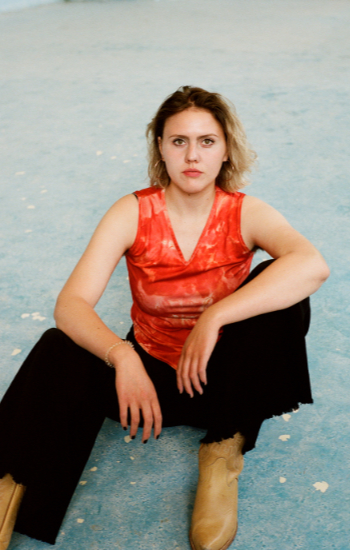Fritzi Wartenberg (GER/AT)
Authors / Theater / Directors / Theater
Fritzi Wartenberg is a director and author. She was born in Cologne and grew up in Salzburg, Austria. She studied comparative literature at the University of Vienna and theater directing at the Max Reinhardt Seminar in Vienna.
In the 22/23 season, Wartenberg was in-house director at the Werkraum of the Berliner Ensemble as part of a one-year residency; this was followed by productions of Ingeborg Bachmann’s MALINA and Max Frisch’s THE ARSONISTS. In the current season, Fritzi Wartenberg is working at Schauspiel Köln and Burgtheater Wien.
As a co-founder of the FTZN collective, she develops pieces with a feminist focus, both text and direction.
AWARDS:
2023 – Helene Weigel Theater Prize
Selected direction projects
VOLKSVERNICHTUNG ODER MEINE LEBER IST SINNLOS AKADEMIETHEATER A Radical Comedy by Werner Schwab
October 18, 2025
Premiere: Burgtheater Wien
Biedermann is outraged by the arsonists who have been starting fire everywhere – at least while he is at his local pub or on social media. But when they actually knock on his door, he politely asks them in, even though they make no attempt to hide their intentions. You have to have manners, after all. And you have to be civil: they are just two harmless peddlers. And if they aren’t, it’s better not to make an enemy of them. It would be unwise to afford that, even though you can afford (almost) everything else.
Written as a political parable, the play targets a mindset that contributes to the success of destructive forces. How does it happen? Why, what for and by who are the impulses to understand simply pushed aside?
ELISABETH! by Mareike Fallwickl
April 2025
World premiere: Burgtheater Wien
The job center has a new assignment: with the help of an inheritance lottery, assets are expropriated and passed on to those in need, all in the name of an equal society! Here, in the overcrowded waiting room of such a job center, the long-term unemployed Maude meets Silke – and a surprising complicity begins.
With JEEPS, Nora Abdel-Maksoud addresses the topic of equal opportunities and social justice and uses humor to question a system which seemingly keeps on reproducing privileges and disadvantages.
JEEPS by Nora Abdel-Maksoud
February 26, 2025
Schauspiel Köln
The job center has a new assignment: with the help of an inheritance lottery, assets are expropriated and passed on to those in need, all in the name of an equal society! Here, in the overcrowded waiting room of such a job center, the long-term unemployed Maude meets Silke – and a surprising complicity begins.
With JEEPS, Nora Abdel-Maksoud addresses the topic of equal opportunities and social justice and uses humor to question a system which seemingly keeps on reproducing privileges and disadvantages.
THE ARSONISTS (dt. Biedermann und die Brandstifter) by Max Frisch
2024
Berliner Ensemble
Biedermann is outraged by the arsonists who have been starting fire everywhere – at least while he is at his local pub or on social media. But when they actually knock on his door, he politely asks them in, even though they make no attempt to hide their intentions. You have to have manners, after all. And you have to be civil: they are just two harmless peddlers. And if they aren’t, it’s better not to make an enemy of them. It would be unwise to afford that, even though you can afford (almost) everything else.
Written as a political parable, the play targets a mindset that contributes to the success of destructive forces. How does it happen? Why, what for and by who are the impulses to understand simply pushed aside?
MONTE ROSA by Teresa Dopler
May 2024
Theater Luzern, CH
„Director Fritzi Wartenberg, who is producing at the Berliner Ensemble as part of the “Worx” program to promote young talent, has turned the original [text] into an entertaining evening worth seeing, which in the end justifiably inspires enthusiasm in the Werkraum in the Berliner Ensemble’s new building.” – Berliner Morgenpost (quote originally in German)
MALINA by Ingeborg Bachmann
March 2024
Berliner Ensemble
Catharina Margaretha Linck was born in Gehofen, Thuringia, in 1687. At the age of 15, Linck took control of their life by breaking out of an orphanage and assuming a new identity as Anastasius Lagrantinus Rosenstengel, living life as a man from that moment on. They were subsequently drafted into the military, soon gained the reputation of a ladies’ man with the help of a “leather tool”, deserted the army, were sentenced to death, managed to escape, married young Catharina Mühlhahn, for which they ended up in court and were finally sentenced to death. Anastasius was the last person born as biologically female to be executed in Europe for fornication with another woman in 1721.
ALIAS ANASTASIUS by Matter*Verse
2023
Berliner Ensemble
Catharina Margaretha Linck was born in Gehofen, Thuringia, in 1687. At the age of 15, Linck took control of their life by breaking out of an orphanage and assuming a new identity as Anastasius Lagrantinus Rosenstengel, living life as a man from that moment on. They were subsequently drafted into the military, soon gained the reputation of a ladies’ man with the help of a “leather tool”, deserted the army, were sentenced to death, managed to escape, married young Catharina Mühlhahn, for which they ended up in court and were finally sentenced to death. Anastasius was the last person born as biologically female to be executed in Europe for fornication with another woman in 1721.
THE WRITER by Ella Hickson
2022
Berliner Ensemble
„Director Fritzi Wartenberg, who is producing at the Berliner Ensemble as part of the “Worx” program to promote young talent, has turned the original [text] into an entertaining evening worth seeing, which in the end justifiably inspires enthusiasm in the Werkraum in the Berliner Ensemble’s new building.” – Berliner Morgenpost (quote originally in German)
